- Home
- Lissa Evans
Crooked Heart Page 15
Crooked Heart Read online
Page 15
‘It’s not the same. People give us money, we don’t take it. What we’re doing isn’t nearly so bad.’
‘That’s not how policemen think.’
‘Well, they should.’
‘Well, they don’t.’
He stuck out his lower lip, childishly, and Vee felt suddenly cold. He was ten. He was ten, and he still thought the whole thing was a game; he was cross with Ray McIver for cheating and now he wanted to tell teacher. What a fool she’d been; she could scream at the risk she’d been taking.
‘Noel.’ Her voice was a fraction of her normal volume, and he looked at her with suspicion.
‘What?’
‘Do you know what would happen if we got caught?’
He made no effort to answer her.
‘I’d go to gaol, and you’d go to a reform school.’
There was a pause. Noel looked past her, at the Boy Scouts dragging a salvage cart along the road.
‘But he shouldn’t get away with it,’ he said, again.
So that’s that, thought Vee. She smiled and nodded, and said, ‘Let’s get home, shall we?’ but inside she was banging the lid down on the whole business. They’d been lucky for too long; from now on she’d have to go collecting on her own. And then she saw herself sitting silently on the train, trailing solo along blasted streets, peering at the street map which Noel always read with such ease, and the thought was dismal and she knew that she wouldn’t stick it. Perhaps the time had come to get back in touch with Vic Allerby, to sew a few hatbands, lie low for a while. Another idea would come along.
They were very nearly home by the time Noel spoke again, and Vee had already moved so far and so fast away from the collecting lark that she had to struggle to follow his argument.
‘What if we went back to that warden and said we knew he’d done it? And told him we’d call the police if he didn’t return everything to Mrs Gifford.’
‘No.’
‘Why ever not?’
Vee paused, remembering the fear on the pawnbroker’s face, and the words that the woman warden, Sausage Curls, had used. Stay away from him. What if it hadn’t been jealousy at all, but a genuine warning?
‘Because,’ she said sharply, ‘that’d be asking for trouble.’
11
That night, St Albans caught its first bomb; at chapel on Sunday morning, the congregation was still vibrating with the thrill of it.
‘I knew,’ said Mrs Williams, surrounded (for the first time in her life) by interested listeners. ‘I heard the whistle as it dropped and I said to Idris, “It’s got our name on it!” and he said, “Well let’s hope it’s spelled wrong,” and I said, “Shall we get under the stairs?” and he said, “Too late for that, girl!” and then he threw himself on top of me.’
First time for everything, thought Vee. The bomb had landed on the shed and Mr and Mrs Williams had survived uninjured, though a chicken had been blown straight through the kitchen window.
‘And which of us,’ asked the Reverend Pilcher from the pulpit, ‘as Satan was conducting his business overhead, did not ask the Lord, “Pray take this cup from me”?’
Vee nearly raised a hand. She had spent most of the raid in the basement of the bookshop beneath the flat, Mr Clare, the owner, having knocked on their door at nine, just after the siren sounded. Donald had been at the cinema, so Vee had left a note for him, roused her mother and Noel, and gone downstairs for what had turned out to be a two-hour social event.
‘I have a thurprithe guaranteed to make the time thpeed by,’ said Mr Clare, holding up a booklet entitled Blackout Fun! and smiling to reveal teeth like old toenails, grey ridges flaring into yellow. ‘They’ve been thelling like hot thauthageth. What shall we thtart with?’ A fine mist of spit obscured every word.
They had begun with Bus Stop, a word game which Noel had won, followed by Silly Rhymes and My Son John Went to Market, both of which he had also won, his mouth bunched tightly to guard against looking too pleased, and then Vee had offered to nip upstairs and make a pot of tea, since Mr Clare had been free with his smiles and she was in need of fresh air and a clean view.
It was a full moon and the road was a stripe of chalk, the houses newly whitewashed. For a moment all was quiet, and then from the north she heard a deep repetitive mutter, like a throat being cleared. The mutter was joined by another, growing steadily louder until, with a roar like a mill-race, two planes crossed overhead, clipping the outline of the moon so that for a second they were perfect silhouettes. Off to London, thought Vee. She waited for the mutter to disappear again before letting herself into the flat. Under the noise of her feet climbing the stairs, she heard other, smaller noises: the hurried rustle of paper and the snap of a lock, and when she opened the kitchen door, Donald was standing by the table, a closed Gladstone bag in front of him.
‘You’re not off somewhere are you?’ she asked.
There was an odd flush to his cheek. ‘Sorting a few things. Didn’t expect you.’
‘What things?’ she asked, but he didn’t answer, just lifted the bag from the table – one-handed; there was no weight to it – and carried it back to his room.
She heard the creak of the bed-springs as he lay down.
‘All clear’s not sounded yet, love,’ she called through the door on her way back out with the tea, but there was no reply from Donald, only a thin scream from the sky and a thump that rattled the crockery, and that was the Williamses’ bomb – dumped by Jerry on the way home, like a fag-end thrown out of a lorry window.
In the chapel porch the next day, the story was on its umpteenth retelling. ‘Not a pane of glass left in the house,’ said Maud Williams, ‘not a plate left on the dresser.’
Vee’s mother scratched something on to her slate and held it up for Mrs Williams to see.
‘No,’ said Mrs Williams. ‘We couldn’t cook it, Mrs Sedge, it was flat, like a cut-out of a chicken.’
Through the thinning crowd, Vee saw the minister’s wife collecting hymn books and remembered yesterday’s resolution. Now that it came to it, she felt less keen on lying low if it meant rearranging Mrs Pilcher’s shed again. She lingered too long and the woman caught her eye.
‘Were you wanting to speak to me, Mrs Sedge?’
‘I was just wondering whether you still needed any help in the house?’
‘Oh . . .’ Mrs Pilcher’s expression teetered between huffiness and hope. ‘I seem to remember you told me you were much too busy. You kept having to take your evacuee to the hospital to get his leg checked.’
‘Yes, but he’s such a lot better now. Stronger. The doctors said it was all the good food and sunshine he’s been getting.’ Both women looked across at Noel. He was leaning against a pew, reading a book while absently sucking the end of his tie. His face was the usual shade of whey.
‘Such a plain child,’ said Mrs Pilcher, and Vee felt an unexpected pang of indignation.
‘He’s clever,’ she said.
‘Really?’ Mrs Pilcher’s tone was doubtful. ‘Well anyhow, Mrs Sedge, I shall certainly consider your offer. In the meantime, could you help me put these in the cupboard?’
The brittle silence lasted all of thirty seconds, before Mrs Pilcher caved in and asked her back four afternoons a week.
She’d thought that Noel would sulk when he heard the news, but his reaction was shocked – wide-eyed, as if she’d spat on the pavement.
‘But we can’t just stop,’ he kept saying, his voice shrill. ‘We have to go back and sort things out.’ In the end she got cross, and told him to stop pestering her.
When Mr Waring announced the outing there was a groan.
‘Fresh healthy air,’ said Mr Waring.
‘It’s foggy, sir.’
‘A light mist.’
‘Sir, I can’t get these boots muddy or my foster mother says she’ll hit me with a big stick with a nail in, sir.’
‘Coats on,’ said Mr Waring. ‘Form into twos. Every pair take a sack from the corner.’
‘Why, sir?’<
br />
‘I shall tell you when we arrive at our destination.’
‘I’m not joking about the stick, sir.’
‘We are not walking across a ploughed field, Pursey. Your boots should remain pristine.’
‘I don’t know what that means, sir. Is it good or bad?’
‘Can anyone define “pristine” for me?’
‘Unsullied.’
‘Thank you, Bostock.’
It wasn’t a dense yellow, like a London fog, but white and diaphanous. From his solitary place at the tail of the crocodile, Noel could still catch the odd glimpse of Mr Waring at the head, as they crossed the road from the school and made their way uphill towards the cathedral.
‘My auntie told me she’s expecting,’ said the girl in front of him to her partner. ‘She says it’s a boy because she’s sticking out so much at the front.’
There was an explosion of giggles.
‘Assemble over here,’ called Mr Waring. The air was filled with cawing, and Noel could dimly see the dark blotches of a rookery overhead. ‘Your task is to collect conkers.’
‘We going to have a tournament, sir?’
‘They are for the war effort. According to the instructions from the Ministry of Supply, the conkers must be husked before being placed in the sacks. We shall spend half an hour here, and your sacks will be weighed when we return to school, with the heaviest receiving a prize.’
‘What sort of prize, sir? A book?’
‘A Mars bar.’
The crocodile split and scattered, in a frenzy of hunting. After a minute or so, Noel bent down and picked up a single green cobble.
‘Not interested in the prize, Bostock?’ asked Mr Waring, from behind him.
‘Not really, sir.’ Noel broke the husk apart, revealing two glossy half-moons. ‘My godmother told me that they did this in the Great War as well. They said they needed them to make cordite, but they were never used and there were piles and piles of rotting conkers outside railway stations.’
One of the Ferris twins dashed past, hesitated, and then nipped back.
‘D’you want those?’ she asked Noel.
‘Yes,’ he said. She pulled a face and dissolved into the mist again. From nearby came the sound of a scuffle.
‘I imagine,’ said Mr Waring, ‘that the current request is as much about benefitting morale as munitions.’ The invisible fight grew louder, and the teacher raised his voice. ‘Conkers obtained by force, Madeley, will be discounted. Do you hear me?’
‘Yes, sir.’
Mr Waring thrust his hands into his pockets, and looked over his shoulder at the cathedral. A row of buttresses receded into whiteness, the clefts between them like sea caves.
‘Have you been into the Abbey, Bostock?’
‘No, sir. I’m an atheist.’
‘And I a Catholic. My father’s house has many mansions. Come and have a look.’
They entered through the wide west door. Inside, someone was playing odd notes on the organ. There was a smell of Jeyes fluid, with just a hint of incense.
‘Largely Norman,’ said Mr Waring. Noel heard the scuff of his own footsteps disappear into the vastness of the nave. He thought of dinosaur bones, of the lofty vaults of the Natural History Museum, of Mattie’s stick clipping along the aisle of the Palm House at Kew. He’d forgotten there could be so much space within a set of walls.
‘I think we should make a pilgrimage to the shrine, don’t you?’ asked Mr Waring. ‘Do you know the tale of the three miracles of St Alban’s martyrdom?’
Noel shook his head. The pilgrim’s path flowed like a stream up the north aisle, the flagstones darkened and polished by a thousand years of footfalls – cloth slippers, leather boots, hobnails, rubber soles. ‘St Alban,’ began Mr Waring, his voice assuming the heightened emphasis of the classroom, ‘was a citizen of the Roman town of Verulamium around the end of the third century. He sheltered an itinerant priest, was converted by him, and then when the Romans arrived on the doorstep he exchanged clothes and went to be executed in his stead. First of all, he was led out of the city and over a river which ran dry in order for him to cross. He then complained of thirst, and a spring bubbled out of the ground in front of him, and finally’ – they skirted a wooden screen, studded with carvings – ‘when Alban was beheaded in front of a large crowd, the executioner’s eyes dropped out.’
‘His eyes?’ repeated Noel, startled. ‘Why his eyes? Why didn’t his axe-arm drop off – wouldn’t that have been more appropriate?’
Mr Waring pursed his lips, pondering the question. The shrine lay just ahead of them, tall and narrow, a stone liner anchored in the sea of faith.
‘Perhaps it was because he’d been witness to an injustice.’
‘Or perhaps,’ suggested Noel, ‘it meant that the last thing he ever saw would stay in his mind for ever and ever.’ An eternity gazing at a jetting neck stump; it was both horrible and superb.
‘Of course, appropriate punishment is very much an Old Testament phenomenon,’ said Mr Waring, still in teaching mode, ‘an eye for an eye, a tooth for a tooth. The New Testament takes quite a different viewpoint – “Vengeance is mine, sayeth the Lord. I shall repay.”’
‘But what if you don’t believe in God?’ said Noel, and his voice was suddenly urgent. ‘Who’ll repay then?’
Mr Waring glanced down at him.
‘Do I take it that you have a specific repayment in mind?’
‘Yes.’
‘Can you tell me more?’
Noel hesitated, choosing his words. ‘There’s been an injustice. Someone took some things from someone else and the person who took the things ought to get punished and the person who lost the things ought to get them back again, but the only other grown-up who knows what happened won’t actually do anything about it.’
‘Why not?’
‘Because she – because this other grown-up is afraid of getting into trouble for doing something else. Something that isn’t nearly as bad as the other thing.’
‘A venial as opposed to a mortal sin?’
‘Yes. If “venial” means “not nearly as bad”.’
‘“Pardonable” would be the definition. Have the victims of this different sort of badness offered their pardon?’
Noel paused. ‘The victims don’t actually know that they’re victims,’ he said.
‘They don’t?’
‘No.’
‘Well now . . .’ Mr Waring clasped his hands together and clicked the knuckles like press-studs. ‘That would be what we’d call a moral dilemma. Is a crime any less wicked because its victims are unaware of its perpetration?’
‘Yes,’ said Noel, with certainty. No one who had contributed to Vee and Noel’s charity-box had ever been carted off to an asylum, screaming that they’d been robbed. ‘So now something really bad – a mortal sin – isn’t being rectified. And it ought to be. It ought to be.’
‘I see.’ Mr Waring’s expression was troubled. ‘Were I having this conversation with one of your classmates then I would assume that an overactive imagination was at play. But that’s not the case here, is it?’
Noel shook his head.
‘I thought not. Bostock, it’s not the job of a ten-year-old to—’
‘Mr Waring!’ Valerie Gibbs, a girl with a perfectly spherical face and an air of prissy certainty, came hurrying around the carved screen. ‘There’s a great big fight out the front of the church, and people have started throwing conkers, and Audrey Ferris has been hit in the eye, and I think she might have been blinded. That’s why I ran in church, I wouldn’t normally, of course, because I know it’s wrong . . .’
Mr Waring followed her out. Noel lingered. Just beside St Alban’s tomb was an iron frame, studded with candle-holders, only one of which held a candle. A notice beside it informed the public of the necessity of saving wax for the purposes of the string industry. Please light the candle solely for the duration of your prayer, and then extinguish. Noel lit it and stared at the wavering blue
flame. Not a prayer, obviously, but a vow; there was no one within earshot and he spoke loudly.
‘Vengeance is mine, sayeth Noel Bostock. I will repay.’
He fished a threepenny bit from his pocket, stuck it in the poor-box, and left the candle burning.
When he got back to the flat after morning school, Vee was out at Mrs Pilcher’s and Donald was sitting at the kitchen table eating cold boiled potatoes with a wedge of ham, and looking at Noel’s London Gazetteer. Beside it was a blank pad of writing paper.
‘Do a letter for me,’ said Donald, without preamble or a question mark.
‘What sort of letter?’
‘Best handwriting.’ With the tip of his knife, he pushed the pad towards Noel. ‘Dear Mr JD.’
‘I don’t have a pen.’
‘On the sideboard.’
Noel uncapped it and removed a hair from the nib.
‘Is it a business letter?’ he asked.
‘Why?’
‘Because business letters are written in a different style to personal letters. They’re more formal.’
‘Just write it. Dear Mr JD.’
‘I should put the signatory’s address first, and then the recipient’s and then today’s date.’
Donald looked at him expressionlessly. ‘Dear Mr JD . . .’
Noel started writing.
‘. . . I will meet at the address you gave at the time you gave to discuss terms before completing the job you said. Yours faithfully Donald Sedge.’
‘That’s more of a note than a letter.’
‘Got any friends at school?’
‘No.’
‘Can’t think why. Do the envelope. It’s er . . .’ Donald consulted something in his pocket; a page crackled. ‘Flat 4, Pembroke Mansions, 195 Exhibition Road, Kensington, London.’
‘That’s the same road the Natural History Museum’s on,’ said Noel.
‘Is it?’
‘South Kensington tube.’
‘You know it?’
‘I should say I do. I’ve been there hundreds of times.’
Donald hesitated, and looked again at the open page of the Gazetteer, the roads like a tangle of snipped threads. ‘Fancy a day out?’ he asked Noel.

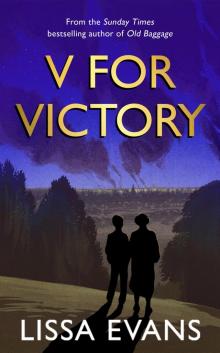 V for Victory
V for Victory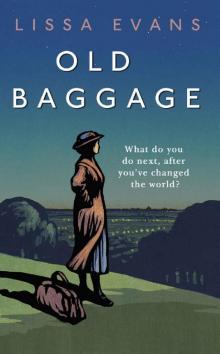 Old Baggage
Old Baggage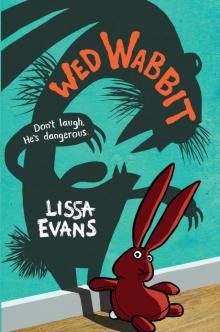 Wed Wabbit
Wed Wabbit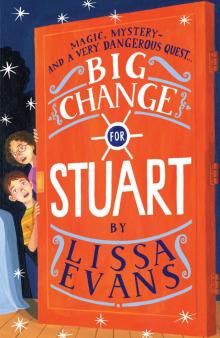 Big Change for Stuart
Big Change for Stuart Spencer's List
Spencer's List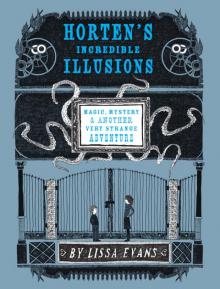 Horten's Incredible Illusions
Horten's Incredible Illusions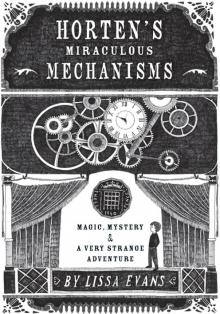 Horten's Miraculous Mechanisms
Horten's Miraculous Mechanisms Their Finest Hour and a Half
Their Finest Hour and a Half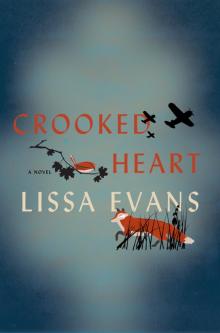 Crooked Heart
Crooked Heart